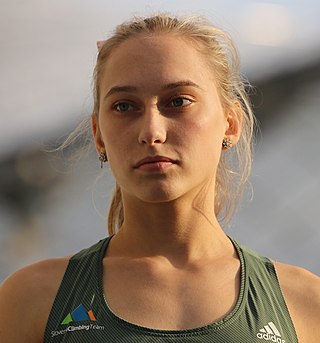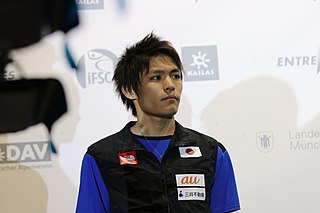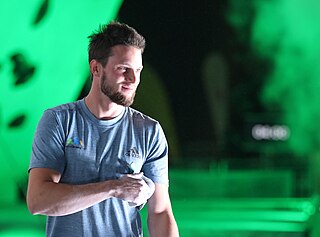
Shauna Coxsey is an English professional rock climber. She is the most successful competition climber in the UK, having won the IFSC Bouldering World Cup Season in both 2016 and 2017. She retired from competition after competing in the 2020 Olympics., and continues to climb at a high level outdoors.

The bouldering events at the 2015 IFSC Climbing World Cup took place in various countries between May and August of that year. The winners were awarded trophies, the best three finishers received medals, and prize money was awarded to the top six finishers at each stop. At the end of the season an overall ranking was determined based upon points, which athletes were awarded for finishing in the top 30 of each individual event. Akiyo Noguchi won the overall women's World Cup and Jongwon Chon won the overall men's World Cup.

The 2016 season of the IFSC Climbing World Cup was the 18th season of the competition. Bouldering competitions were held at the seven stops of the IFSC Climbing World Cup. The bouldering season began on April 15 at the World Cup in Meiringen, and concluded on 12 June at the World Cup in Munich. At each stop a qualifying was held on the first day of the competition, and the semi-final and final rounds were conducted on the second day of the competition. The winners were awarded trophies, the best three finishers received medals, and prize money was awarded to the top six finishers at each stop.

Janja Garnbret is a Slovenian professional rock climber who specializes in sport climbing and competition climbing. She has won multiple competition lead climbing and competition bouldering events, two Olympic gold medals, and is widely regarded as the greatest competition climber of all time. In 2021, Garnbret became the first-ever female Olympic gold medalist in climbing, and successfully defended her title in 2024. With two gold medals, she is the most successful Slovenian athlete at the Summer Olympics. She is also the world's first-ever female climber to onsight an 8c (5.14b) graded sport climbing route.

Akiyo Noguchi is a Japanese professional rock climber who specializes in competition bouldering as well as outdoor bouldering and sport climbing.

Tomoa Narasaki is a Japanese professional rock climber who specializes in bouldering and competition bouldering.

The 2018 season of the IFSC Climbing World Cup was the 20th season of the competition. Bouldering competitions were held at seven stops of the IFSC Climbing World Cup. The bouldering season began on April 13 at the World Cup in Meiringen, and concluded on 18 August with the World Cup in Munich. At each stop a qualifying was held on the first day of the competition, and the semi-final and final rounds are conducted on the second day of the competition. The winners were awarded trophies, and the best three finishers received medals. At the end of the season an overall ranking was determined based upon points, which athletes were awarded for finishing in the top 30 of each individual event. Jernej Kruder won the seasonal title in the men's competition and Miho Nonaka won the women's. Japan won the national team competition.

The 2017 season of the IFSC Climbing World Cup was the 19th season of the competition. Bouldering competitions were being held at seven stops of the IFSC Climbing World Cup. The bouldering season began on April 7 at the World Cup in Meiringen, and concluded on 19 August at the World Cup in Munich. At each stop a qualifying was held on the first day, and the semi-final and final rounds were conducted on the second day of the competition. The winners were awarded trophies, and the best three finishers received medals. At the end of the season an overall ranking was determined based upon points, which athletes were awarded for finishing in the top 30 of each individual event. Shauna Coxsey won the women's World Cup and Jongwon Chon won the men's World Cup.

The 2018 IFSC Climbing World Championships, the 15th edition, were held in Innsbruck, Austria from 6 to 16 September 2018. The championships consisted of lead, speed, bouldering, paraclimbing, and combined events.
The 2017 IFSC Climbing World Cup was held in 15 locations. Bouldering competitions were held in 7 locations, lead in 8 locations, and speed in 7 locations. The season began on 7 April in Meiringen, Switzerland and concluded on 12 November in Kranj, Slovenia.
The 2018 IFSC Climbing World Cup was held in 14 locations. There were 22 events: 7 bouldering, 7 lead, and 8 speed events. The season began on 13 April in Meiringen, Switzerland, and concluded on 28 October in Xiamen, China.
The 2016 IFSC Climbing World Cup was held in 16 locations. Bouldering, lead and speed competitions were held in 7 locations. The season began on 15 April in Meiringen, Switzerland and concluded on 27 November in Kranj, Slovenia.
The 2015 IFSC Climbing World Cup was held in 13 locations. Bouldering competitions were held in 5 locations, lead in 7 locations, and speed in 5 locations. The season began on 17 May in Central Saanich, Canada and concluded on 15 November in Kranj, Slovenia.
The 2009 IFSC Climbing World Cup was held in 14 locations. Bouldering competitions were held in 5 locations, lead in 6 locations, and speed in 4 locations. The season began on 11 April in Kazo, Japan and concluded on 15 November in Kranj, Slovenia.
The 2019 IFSC Climbing World Cup was held in 12 locations. Bouldering, lead and speed competitions were each held in 6 locations. The season began on 5 April in Meiringen, Switzerland with the first bouldering competition in the season, and concluded on 27 October in Inzai, Japan, with the last lead climbing competition in the season.

Ai Mori is a Japanese professional rock climber who specializes in competition lead climbing and competition bouldering.
The 2021 IFSC Climbing World Cup was the 33rd edition of the international sport climbing competition series, held in seven locations. There are 11 events: four bouldering, five lead, and two speed events. The season began on 16 April in Meiringen, Switzerland with the first bouldering competition in the season, and concluded on 4 September in Kranj, Slovenia. The International Federation of Sport Climbing had initially scheduled 18 events concluding on 31 October, but COVID-19 travel restrictions resulted in the cancellation of events in Xiamen and Wujiang in China, Jakarta in Indonesia and Seoul in South Korea.
The 2021 season of the IFSC Climbing World Cup was the 22nd season of the competition. Bouldering competitions will be held at six stops of the IFSC Climbing World Cup. The bouldering season began on April 16 at the World Cup in Meiringen, and concluded on 26 June with the World Cup in Innsbruck. The International Federation of Sport Climbing had initially scheduled six bouldering events concluding on 24 October, but COVID-19 travel restrictions resulted in the cancellation of events in Wujiang in China and Seoul in South Korea.
Competition lead climbing at the 2019 IFSC Climbing World Cup was held over six stages at six different locations, from 4 July to 27 October 2019. The top three in each competition received medals, and at the end of the season, the overall winners were awarded trophies. The overall winners were determined based upon points, which athletes were awarded for finishing in the top 30 of each individual event. Adam Ondra won the men's seasonal title, Chaehyun Seo won the women's seasonal title, and Japan won the national team title.
The 2022 IFSC Climbing World Cup is the 34th edition of the international sport climbing competition series organised by the International Federation of Sport Climbing (IFSC), held in 12 locations. There are 21 events: six bouldering, seven lead, seven speed, and one bouldering & lead combined events. The series began on 8 April in Meiringen, Switzerland with the first bouldering competitions of the season, and concluded on 22 October in Morioka-Iwate, Japan, which introduced the Boulder & Lead combined format that will be used at the 2024 Summer Olympics in Paris.








